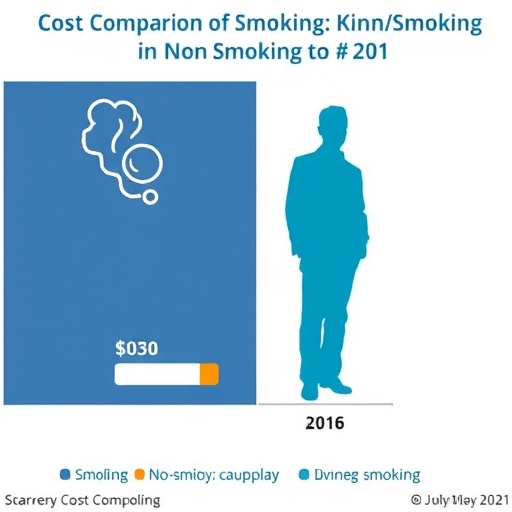Tobacco smoking has long been recognized as a significant public health concern, and its implications extend far beyond the realm of individual health. A systematic review and meta-analysis conducted by Sweis et al. sheds light on the economic burden associated with self-reported tobacco smoking in comparison to non-smoking. This nuanced investigation offers critical insights into the direct healthcare costs attributed to smoking, which are often underestimated in discussions surrounding tobacco use and policy formation.
At its core, the research identifies the staggering expenses that smoking imposes on healthcare systems. Although the health risks of tobacco use are widely acknowledged, the financial implications remain a topic that requires more rigorous examination. The study meticulously analyzed existing data on healthcare costs, delving into the resources spent on treating smoking-related illnesses. This evaluation is vital for understanding the broader economic impacts of tobacco use on society and healthcare systems.
The methodology employed by Sweis and colleagues involved a comprehensive literature search, encompassing a diverse array of studies that report on direct health care costs incurred by smokers compared to non-smokers. By synthesizing these findings, the authors aimed to establish a clearer understanding of the correlation between smoking status and healthcare expenditures. Importantly, the inclusion of various demographics and health conditions in the analysis allowed for a robust examination of the economic burden associated with tobacco.
One of the notable outcomes of the research is the revelation of the overwhelming costs incurred by individuals who smoke. The study found that smokers are responsible for significantly higher healthcare expenditures compared to their non-smoking counterparts. This finding underscores the need for public health interventions aimed at reducing tobacco use and ultimately alleviating the strain on healthcare systems. The long-term financial implications can be staggering, impacting not only smokers but also society at large in terms of increased healthcare costs and lost productivity.
Moreover, the nuances of the economic burden associated with smoking are compounded by the social determinants of health that influence smoking behaviors. Socioeconomic status, access to healthcare, and education levels play a critical role in shaping smoking prevalence and health outcomes. The research highlights the importance of addressing these factors in the context of smoking cessation efforts and public health strategies.
Understanding the direct healthcare costs linked to smoking also opens up discussions regarding policy changes. Tobacco taxation, regulations on advertising, and smoking cessation programs are all strategies that can mitigate the financial burden of smoking on healthcare systems. By leveraging evidence from studies like the one conducted by Sweis et al., policymakers can make informed decisions that prioritize public health while also considering economic factors.
The implications of this research extend beyond healthcare costs; the findings have significant implications for workplace environments. Employers are increasingly aware of the costs associated with smoking, which can include increased absenteeism, decreased productivity, and higher insurance premiums. Organizations are now more motivated than ever to implement smoking cessation programs and support a healthier workforce.
Furthermore, the evidence presented in this study reinforces the notion that preventing tobacco use from young ages can significantly reduce healthcare costs in the future. Educational initiatives and community programs aimed at discouraging tobacco use among youth are critical components of tobacco control efforts. By investing in prevention, society may ultimately save considerable healthcare resources.
The economic burden of tobacco smoking also highlights the need for continuous research in the field. As tobacco products evolve, especially with the advent of e-cigarettes and vape devices, understanding their impact on healthcare costs becomes increasingly complex. Future studies should explore not only the costs associated with traditional smoking but also those linked to emerging tobacco products, as these could shape healthcare expenditures in unforeseen ways.
In conclusion, the systematic review and meta-analysis conducted by Sweis et al. underscore the financial implications of tobacco smoking on healthcare systems. The significant economic burden felt by smokers compared to non-smokers serves as a clarion call for public health interventions and policy changes aimed at reducing tobacco use. As we navigate the complexities of smoking in contemporary society, the findings of this research provide a crucial framework for future studies aimed at elucidating the relationships between tobacco use, health outcomes, and economic costs.
The economic burden of tobacco smoking is an issue that demands attention from healthcare professionals, policymakers, and the general public alike. Understanding the financial implications of smoking can help in crafting targeted interventions designed to alleviate strain on healthcare systems and improve overall public health outcomes. With data-driven insights like those provided by Sweis et al., we are better equipped to tackle the tobacco crisis head-on and foster a healthier future for generations to come.
This research emphasizes the importance of collaboration among stakeholders in the public health arena. By uniting efforts from healthcare providers, policymakers, and communities, we can effectively address the persistent issue of tobacco smoking and its associated economic toll. Through collective action, the hope is to reduce smoking prevalence and the consequential healthcare costs, ultimately striving for a healthier, smoke-free society.
In navigating the complexities of public health, economic analyses such as those presented by Sweis et al. serve as essential tools for advancing a holistic understanding of tobacco-related burdens. As we critique and develop health policies moving forward, the information gleaned from such studies will play an integral role in shaping evidence-based strategies to combat tobacco use and foster a healthier population for the future.
Subject of Research: Economic Burden of Tobacco Smoking Compared to Non-Smoking
Article Title: Economic Burden of Self-Reported Tobacco Smoking Compared with Non-Smoking: Systematic Review and Meta-Analysis of Direct Health Care Costs
Article References:
Sweis, N.J., Elfessi, Z.Z., Rubinstein, I. et al. Economic Burden of Self-Reported Tobacco Smoking Compared with Non-Smoking: Systematic Review and Meta-Analysis of Direct Health Care Costs.
Adv Ther (2025). https://doi.org/10.1007/s12325-025-03318-0
Image Credits: AI Generated
DOI: 10.1007/s12325-025-03318-0
Keywords: Tobacco smoking, Economic burden, Direct healthcare costs, Public health policy, Smoking cessation, Healthcare expenditures, Socioeconomic factors.




